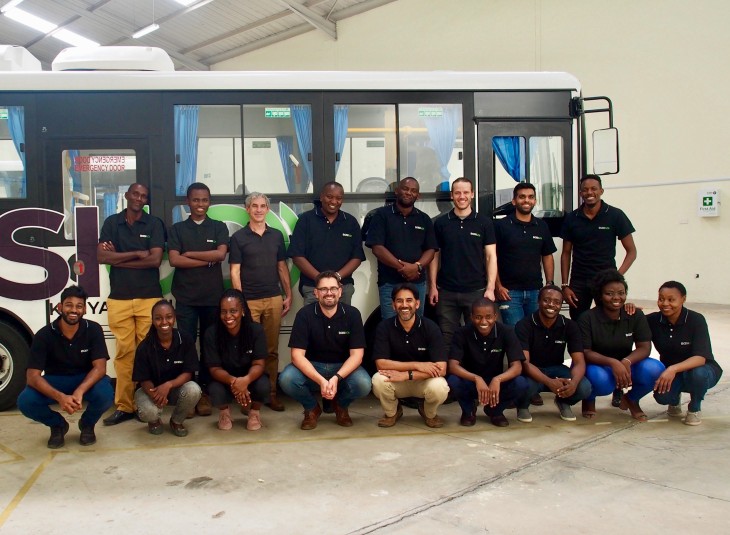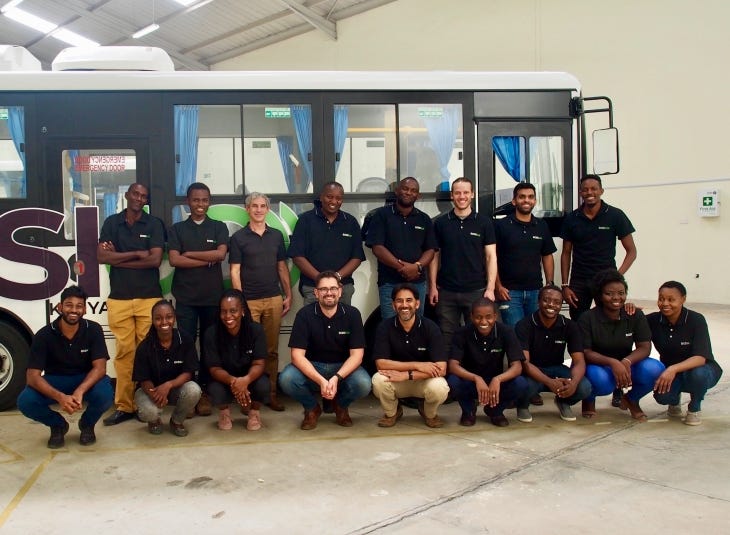Kenya’s BasiGo Raises $6.6M In New Funding From Leading Autotech Investors
BasiGo, Kenya’s first electric bus company, has announced $6.6 million in new funding led by Mobility54, Toyota Tsusho’s corporate venture capital arm; Trucks VC, a transportation-focused venture capital fund in Silicon Valley; and Novastar Ventures, a global VC supporting entrepreneurs transforming African markets. Moxxie Ventures, My Climate Journey (MCJ), Susquehanna Foundation, Keiki Capital, and OnCapital also contributed to the round. BaisGo’s total funding in 2022 now stands at $10.9 million, allowing the company to begin commercial delivery of locally manufactured electric buses and charging infrastructure via the company’s unique Pay-As-You-Drive financing model.

“BasiGo is thrilled to have the backing of investors who are leaders in the automotive sector and climate finance,” said Jit Bhattacharya, CEO of BasiGo. “Over 90% of Kenya’s electricity already comes from renewables. Yet Kenya’s transport sector relies entirely on imported petroleum fuels. By electrifying Kenya’s public transport, we can make an immediate dent in climate emissions, clean up the air in our cities, and give bus owners relief from the rising cost of diesel. With this new funding, BasiGo is ready to bring the benefits of state-of-the-art electric transport to all people in Africa.”
Why The Investors Invested
Kenya’s public transportation system includes approximately 100,000 privately operated buses and minibuses known as matatus. As part of a fleet operation with two Nairobi bus operators, Citi Hoppa and East Shuttle, BasiGo’s electric buses have travelled over 110,000 kilometres and carried over 140,000 passengers. BasiGo has already had over 100 client reservations and recently announced collaborations with KCB Bank and Family Bank to give owners with up to 90% financing for the purchase of an electric bus.
Read also Sky.Garden, The Kenyan Startup On The Verge Of Shutdown, Acquired
“We strongly believe in the potential of electric buses in Africa” Takeshi Watanabe — CEO of Mobility54 said in a statement. “BasiGo’s strong capability to implement the concept and its cutting-edge technology is the key to transforming conventional diesel buses to environmentally-friendly electric buses. We are extremely excited to build a solid partnership with BasiGo, and to support their growth by fully leveraging the business assets under Toyota Tsusho and CFAO.”
“At Trucks, we back entrepreneurs building the future of transportation. We invested in BasiGo because their Pay-As-You-Drive platform is the key to electrifying and modernising the massive informal public transport market in Africa,” commented Jeff Schox, General Partner of Trucks VC.
Sapna Shah, Partner with Novastar Ventures shared: “BasiGo has grown in leaps and bounds since Novastar’s initial investment in February 2022 — a hugely successful 6-month electric bus pilot, 100+ electric bus reservations from Nairobi’s leading public bus operators, local financing agreements with leading Kenyan banks, commercial order and production of 15+ electric buses and a strengthened team. We are excited to continue partnering with the exceptional team at BasiGo as they enter this next growth phase and welcome new investors, especially Mobility54 and Trucks VC, to this exciting journey.”
Read also Nigerian Mobility Startup Moove Gets Financing Facility to Scale UK Operations
A Look At What The Startup Does
BasiGo, founded in 2021 by Jit Bhattacharya, uses a Pay-As-You-Drive strategy that allows owners to buy an electric bus for the same upfront cost as a diesel bus. Operators then pay BasiGo a subscription cost of KES 20 ($0.17) per kilometre, which includes leasing the E-Bus battery, charging at BasiGo charge stations, and comprehensive care and maintenance from BasiGo. With recent fuel price increases in Kenya, Nairobi bus operators are now paying an estimated KES 30–50 ($0.25-$42) per kilometre for diesel fuel alone.
Read also African fintech Startup MFS Africa Buys US Firm Global Technology Partners, Expands To US
The next 15 electric buses from BasiGo will be delivered in January and will begin service with many of Nairobi’s leading bus companies. To accommodate this expanding fleet, BasiGo is already constructing high-power, DC fast-charging stations in strategic places throughout Nairobi. According to the company, all buses delivered in 2023 will be locally assembled in Kenya, and the company plans to have over 1,000 electric buses in Kenya by the end of 2025.
BasiGo funding BasiGo funding
Charles Rapulu Udoh

Charles Rapulu Udoh is a Lagos-based lawyer, who has several years of experience working in Africa’s burgeoning tech startup industry. He has closed multi-million dollar deals bordering on venture capital, private equity, intellectual property (trademark, patent or design, etc.), mergers and acquisitions, in countries such as in the Delaware, New York, UK, Singapore, British Virgin Islands, South Africa, Nigeria etc. He’s also a corporate governance and cross-border data privacy and tax expert.
As an award-winning writer and researcher, he is passionate about telling the African startup story, and is one of the continent’s pioneers in this regard. You can book a session and speak with him using the link: https://insightsbyexperts.com/view_expert/charles-rapulu-udoh







